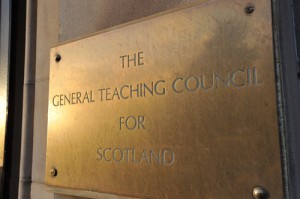CRIMINAL record checks on newly-qualified teachers revealed 56 crimes or offences in just one year – all but two of whom were still allowed into the classroom.
The checks uncovered assaults, possession of Class A drugs and burglary, as well as numerous road traffic offences, including drink-driving.
Fifty four of the teachers were allowed to carry on with their careers but two agreed to withdraw from the profession while further investigations were being carried out.
The details were released by the General Teaching Council for Scotland (GTCS), which regulates the profession north of the border.
The compulsory checks were carried out as teaching students finished their university courses and were about to embark on their probationary year in Scottish schools last August.
While there was nothing to rival the fictional exploits of Breaking Bad chemistry teacher Walter White, the checks revealed one student teacher had been found guilty of possession of a Class A drug in 2012 and given an absolute discharge.
Another prospective teacher had a conviction for possession of a Class B drug.
There were also two cases of vandalism, one from 2007 and another from 1997, and three cases relating to breaches of the peace.
It emerged one teaching hopeful had a 2000 conviction for assault, another a 2009 conviction for assault and breach of the peace, another resisted arrest the same year, and a fourth was convicted of “burglary (between 1974 and 1976)”.
Other cases involved student teachers who had been cautioned, including one for possession of a Class B drug and one for vandalism.
Of the 56 cases, 43 related to road traffic offences, eleven of them for drink-driving, 12 for driving without insurance and seven for other matters including careless driving, no MOT and speeding.
In all the above cases, student teachers were allowed to carry on to their probationary year.
In another case, a student who was convicted of assault in 2011 withdrew from the profession while the GTCS was carrying out further investigations. A second student withdrew immediately after checks revealed an undisclosed matter.
The convictions and cautions were revealed by the Protecting Vulnerable Groups Scheme (PVG) which is carried out by the GTCS.
The PVG check is meant to ensure that those who have regular contact with children and protected adults do not have a history of harmful behaviour.
Siobhan Freegard, founder of Britain’s biggest parenting site Netmums said: “Parents may well be very concerned that nearly every teacher flagged up on a PVG check ended up in the classroom.
“While minor youthful misdemeanours can be overlooked as someone grows up, it’s worrying to see teachers with convictions for burglary and drug crimes.
“Like it or not, teachers are a role model and need to have the respect of both the children they teach and their parents. It makes it much harder to have this if children know you’ve been convicted of a crime.”
Alison Todd, Director of Children and Families Services at CHILDREN 1ST said: “We would hope that at the very least the GTCS has interrogated some of these disclosures further to ascertain that there is no on-going risk to children.
“While we cannot comment on individual cases, it is everybody’s responsibility to protect children.
“It is absolutely appropriate for the GTCS to require new applicants to register on the PVG scheme.
“It’s a necessary part of a robust recruitment process designed to limit the possibility of adults who are unsuitable working with children.”
The PVG Scheme is managed and delivered by Disclosure Scotland, which, is an executive agency of the Scottish Government.
Responsibilities include taking decisions, on behalf of Scottish Ministers, about who should be barred from working with vulnerable groups.
A GTCS spokesman: ““GTCS is regularly asked this question about Protection of Vulnerable Groups checks. It is important to stress that if information is flagged that suggests an individual might pose a risk to children, they will not be allowed on the teaching register.
“The PVG scheme flags up convictions including those for road traffic offences such as speeding. We can reassure the public that none of the offences indicated impacted on an individual’s Fitness to Teach which is the standard we use to register teachers.
“There are 75,000 teachers on the teaching register in Scotland. Of that number last financial year 25 teachers were removed from the register following a Fitness to Teach panel.”

